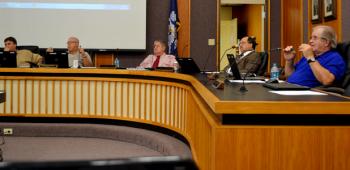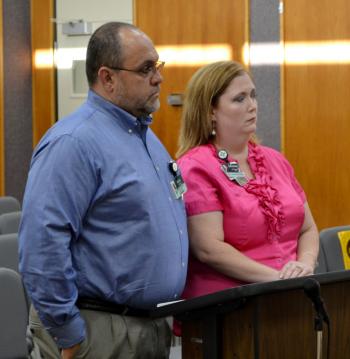
School board members, from left, David Lalande, Doug LaCombe, Superintendent John Bourque, John Suire and Gene Daigle, along with Milton Simar and Delo Hebert, not pictured, discuss the idea of Telemed use in two parish schools.

From left, Lafayette General Foundation Executive Director Cian Robinson and Acadia General Hospital CEO Heather Harper explain the Telemed program to Acadia Parish’s Personnel, Insurance and Curriculum Committee.
Committee learns of Telemed, receives reports
Jeannine LeJeune
Online Editor
Crowley Post-Signal
Acadia General Hospital may have a way to solve part of two problems with one solution: Telemed.
Currently awaiting news on a grant to fund a pilot program in Acadia Parish, the hospital looks to alleviate some of the stress on its emergency room while helping school attendance simultaneously through the program using the Telemed technology.
According to AGH CEO Heather Harper and Lafayette General Foundation Executive Director Cian Robinson, the program has seen success in two parishes already under the Lafayette General Health umbrella: Lafayette Parish and St. Martin Parish. Furthermore, Harper stated Wednesday night at the Personnel, Insurance and Curriculum Committee meeting of the Acadia Parish School Board, Telemed was used in the Tennessee school her children attended prior to her move to Crowley.
The purpose of Robinson and Harper’s presentation Wednesday was to begin laying the groundwork for an agreement should the grant be approved in the spring. In the meantime, AGH, the LGH system and the school board can look to come to some agreement as to how it would be implemented at the two schools: Ross Elementary and South Crowley Elementary. The two schools were chosen after looking at a couple of key factors – attendance and population. Consent forms would, of course, be presented to the parents at the beginning of the year.
The Telemed proposal is simple. AGH will pay the salary for one nurse who would be employed by AGH, as well as their travel expenses, and work exclusively at Ross and South Crowley, splitting his or her time between the schools and traveling to the other as need dictates.
Through the grant – $100,000 in total, distributed over two years – the Telemed machine and some medical supplies would be purchased.
When a child comes to the office for medical aid, he or she would be treated rather similarly to how they are now. If the child has a headache, the nurse can help as they do now. If he or she says she has a sore throat, the nurse can run a swab to test for strep throat to help determine if he or she is contagious. The machine also allows for a doctor in the AGH emergency room to check the child’s throat, skin, etc. electronically. If the swab comes back positive, the child can be secluded in the nurse’s area until a parent arrives. If they are not contagious, the child can be helped as prescribed and sent back to class, thereby increasing children’s time in the classroom.
One thing made perfectly clear Wednesday to the board, however, is that this move will only support medical care already provided to a child. It will not replace a child’s primary care physician. Secondly, the two added that the care provided will not be invasive. In many regards, the nurse will be doing what the school’s nurse already does.
School board member Milton Simar brought forth the idea of using Acadia’s already employed school nurse, but Robinson and Harper both stressed that liability would come back to the board if it did so. Superintendent John Bourque countered with the idea that the board could look to alleviate the current nursing staff of five’s crazy schedules by splitting their time a little less as those two schools would no longer need to be visited by an APSB nurse.
If the program is deemed a success, AGH would like to see it implemented in other places in the parish, as budget allows. It is then, after the grant runs out, that the other avenues of revenue would be explored. And, furthermore, according to Robinson, the system is prepared to find other ways to fund the program if the grant isn’t approved.
While there is definitely time between now and the hopeful answer date of March 2016, the board requested to see a copy of the proposed agreement as soon as possible for its attorney to review. Robinson and Harper agreed as the item came to a close.
The committee meeting ended up being mostly informative and reports with only one item being moved to the full board.
In other reports, Dave Schultz, managing consultant for Student Transportation Specialists explained the ongoing work and progress made with that parish’s transportation system.
For starters, he reported that STS sees the implementation of the Iota area’s new routes as a success as only a few minor hiccups have occurred. He only remembered receiving two call in total over the re-routing. The buses are now averaging 60-62 children per route, giving the area a bit of room to grow.
The latter part of that is highly important as STS has noticed a trend: the district doesn’t have really more students as much as it has more bus riders. The Richard area, Schultz explained may have to look at adding another bus and/or route in the area in the coming years and the Crowley area, particularly South Crowley Elementary area, and the Rayne area are close to capacity.
STS is now looking at the special education/special population bus routes and making sure conditions and needs are properly documented so that any future shifting of bus routes in that group does not cause any problems.
Not only was STS productive in the past month, so too was Johnson Controls, Inc., according to Project Manager “Chip” Moore.
“We had one of the, if not the, most productive months,” he explained.
The group has made great strides in lighting, with only two schools remaining in that category. Moore believes that lighting work at Evangeline Elementary could be finished this week and Richard Elementary by the first week in November.
As far as controls go, those are moving along, too. JCI is focused in Midland working on controls and expects to be there for another week and a half to two weeks before moving on.
As it moves along and gets closer to the end of the year, JCI continues to push forward to make its January deadline. It expects to meet the goal, according to Moore.
In the final report of the night, Executive Director of Curriculum Margaret Jones explained the parish hopes to have preliminary PARCC testing results for the district Thursday, but it will probably November before individual results in math and English/language arts are available. School Performance Scores are slated to be available some time in December.
It’s perhaps been the biggest headache for parish teachers: if they have an area to improve on in regard to teaching students for these, they still don’t know. Furthermore, Louisiana still has not purchased standardized testing for students to take this spring. Teachers in the parish are teaching, but for what is anyone’s guest.
Jones and Bourque also explained to the board, that, in the interim, Acadia is working with its teachers to help alleviate some of the local assessment stress. They are having instructional assistants become more involved in creating a potential test bank for teachers to pull from, if they choose, and encouraging teachers to look into the idea of alternating weeks with assessments and other grades to equal the seven to nine grades outlined in the parish’s Pupil Progression Plan. In the future, once some of the dust settles, Acadia will look at maybe adding benchmark assessments, perhaps in December, to help teachers gage where students are heading into spring.
The plan, according to Bourque, would help not only students burned out from testing, but teachers as well, allowing them a chance to review test material with students and just teach in general.
There is, however, one growing problem in Acadia Parish, and other parishes for that matter. There aren’t enough teachers anymore.
On a motion by Gene Daigle, and a second by Simar, the committee recommended the full board officially declare a “critical shortage of teachers in special education and core subject areas.”
Executive Director of Personnel/Operations Ellan Kay Baggett explained that schools like the University of Louisiana at Lafayette has seen drastic decreases in graduation in the education field. There are, of course, a variety of factors not helping that along with students seeing the ever-changing roller coaster of Louisiana education and changes in postsecondary standards that are being batted around.
Under the “critical shortage” mandate, the parish must meet certain criteria to claim it. If it becomes official, the parish is given leeway to hire retired teachers to fill vacancies at no penalty to the board or the teacher and/or hire teachers that are, for example, not certified in science but maybe in math to teach science. Teachers that are properly certified and not retired would, of course, be more desired and be hired over the others, but it will hopefully alleviate some of the issues Acadia is already facing.
- Log in to post comments
